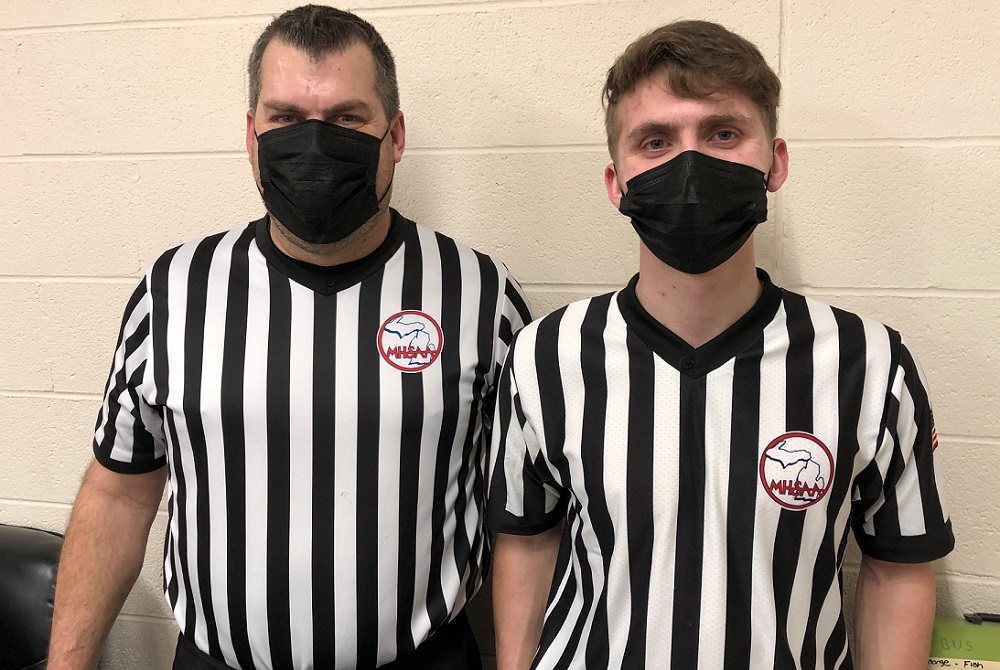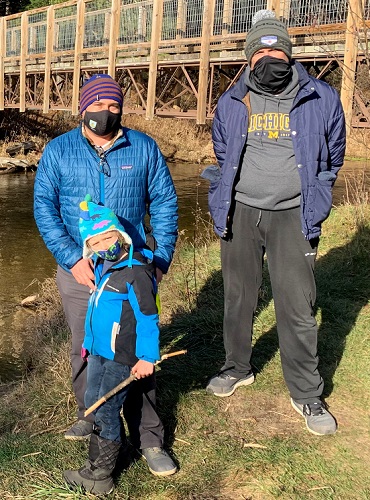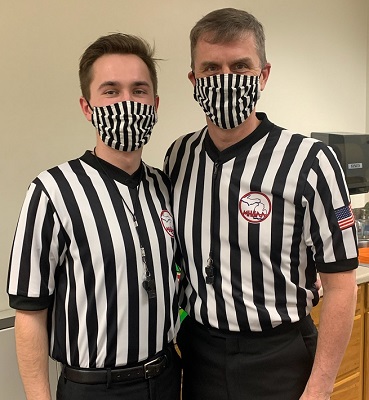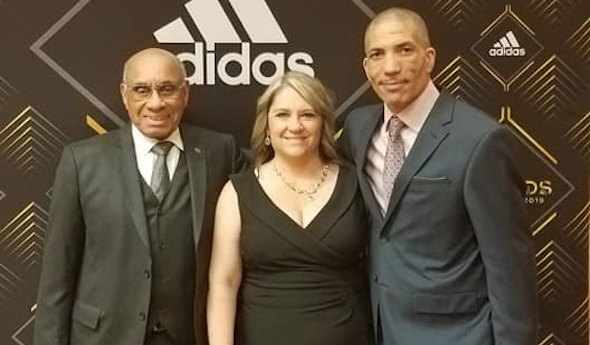
Legacy Families Bolstering North's Officiating Ranks
By
Tom Spencer
Special for MHSAA.com
March 12, 2021
When Marc Crossman was attending middle and high school at Benzie Central, he didn’t attempt a shot. He never blocked a shot either.
 For that matter, the 2019 grad was never charged with a foul or a violation, nor credited with an assist.
For that matter, the 2019 grad was never charged with a foul or a violation, nor credited with an assist.
Today, he uses the fitness he’s kept up from his track and cross country days at Benzie to call fouls and violations. And, nearly every day, he assists high school boys and girls on basketball courts all over Northern Michigan.
Crossman is one of very few young MHSAA basketball officials in the north. He is also among a handful of father-son basketball and other sports officials calling Northern Michigan home.
“I tell you what man, I was probably the most dedicated fan in high school,” he said. “I went to all the home games. All the away games, boys, girls.
“When I was in high school, I was obsessed with the game of basketball.”
Crossman did play elementary basketball. He tried out for the Huskies middle school team but wasn’t chosen.
“That was the end of my basketball career,” proclaimed Crossman, who also officiates football. “And then it started up again when I was a junior when my dad (Don) roped me into the whole legacy thing with officiating.
The MHSAA’s Legacy Student Officials Program is open to any high school student at least 14 years of age. Freshman and sophomore student officials may officiate at the junior high/middle school level only, and junior and senior student officials may officiate at any subvarsity level.
 The Legacy Program pairs a student with a mentor official, which can be set up through direct contact with an official the student knows, or with help from the student’s athletic director in making contact with a local approved officials association. Lucky for Crossman, he did know someone, his father Don, an assignor for the Northern Michigan Sports Officials Association.
The Legacy Program pairs a student with a mentor official, which can be set up through direct contact with an official the student knows, or with help from the student’s athletic director in making contact with a local approved officials association. Lucky for Crossman, he did know someone, his father Don, an assignor for the Northern Michigan Sports Officials Association.
Don is a nine-year veteran official registered in baseball, softball, volleyball and football. He’s aware of the severe shortage of officials in general, but keenly aware most officials are closer to retiring than starting on the hard court. He’s enjoyed working with his son and assigning him with others.
He also has the good fortune of having other father-son combinations to assign. Among them are Tom and Ben Post and John and Jayden O’Hagan. Ben Post and Jayden O’Hagan also started in the Legacy Program, with Ben among the first to take part.
Tom Post has been a registered official for 48 years and honored with MHSAA Finals assignments. John O’Hagan has 36 years of basketball experience and registered for baseball and softball spanning two decades.
All of those fathers and sons indicate they enjoy working together and with other partners, but note officiating comes with some challenges.
Most come from fans and coaches rarely seeing a young referee in the crew.
“There have been a few games where the coaches just seem to get in his (Jayden’s) ear more than the experienced official,” said his father. “My fear is that Jayden — and all other referees — might one day say ‘I had enough of getting screamed at all the time and want to quit.’
“We talk to coaches, we explain their youth and that we are teaching and trying to recruit more young officials,” John O’Hagan continued. “Recruiting is difficult enough encouraging people to get registered; however, when the coaches and fans simply forget it is just a game, that we are human and we will make mistakes, their behavior can deter folks from becoming a referee.”
With ongoing support and teaching from his father and regular partner Dave Nemecek, Jayden is excited to hit the court after his days as a college student.
“My dad has taught me everything I know when it comes to the game and rules side of it,” noted the 19-year-old O’Hagan. “He’s always watching me and having me do certain things to make sure that I’m doing the best I can.
“So when there’s nights I’m just not having it or am not doing good, he makes sure to let me know,” he continued. “He always keeps me on top of my game.”
The assignor Crossman enjoys helping his son navigate the referee waters.
“It is awesome, very cool,” he said. “It is fun to see him grow. It is a challenge for me to help him grow.”
 Ben Post is among a significant number of Northern Michigan referees not officiating during the current pandemic. He had been on the hard court every year since graduating from college and starting to teach at age 24 in 2004.
Ben Post is among a significant number of Northern Michigan referees not officiating during the current pandemic. He had been on the hard court every year since graduating from college and starting to teach at age 24 in 2004.
“I absorbed his (my father’s) officiating philosophy pretty much through osmosis, and as a result we call a pretty similar game, although I have no hope of matching his competence or consistency,” Ben Post pointed out. “My dad is most in his element while working a game, and I’ve cherished every opportunity to watch and study him in that element, first as a fan and then while working alongside him.”
The pandemic has younger northern referees like Gabriel Wise, Gabe Janowiak, Brandon Nichols, Marc Crossman and Jayden O’Hagan perhaps finding themselves in tougher assignments than they anticipated this early in their careers.
“Now you’re in it,” Don Crossman said of the opportunities taken on by the younger refs. “You’ve proved yourself on a fast track.
“You’re just one of the guys now,” he continued. “It is real exciting.”
Younger referees are becoming a welcome site nowadays for coaches and athletic directors.
“When a crew comes to the gym and there are officials of varying ages, the diversity provides credibility to the crew as a whole,” said Steve Graetz, Benzie’s athletic director.
Graetz is filled with pride when he sees the youthful Crossman on the court, especially knowing he started doing many middle school games at Benzie in the Legacy Program.
“It was a safe environment in which Marc could learn the craft,” Graetz said. “To see him now regularly officiating high school games at varying levels on a regular basis speaks as much to the hard work he has put into learning and improving as it does to the accommodating format and structure of the Legacy Program.”
 Tom Spencer is a longtime MHSAA-registered basketball and soccer official, and former softball and baseball official, and he also has coached in the northern Lower Peninsula area. He previously has written for the Saginaw News, Bay County Sports Page and Midland Daily News. He can be reached at [email protected] with story ideas for Manistee, Wexford, Missaukee, Roscommon, Ogemaw, Iosco, Alcona, Oscoda, Crawford, Kalkaska, Grand Traverse, Benzie, Leelanau, Antrim, Otsego, Montmorency, Alpena, Presque Isle, Cheboygan, Charlevoix and Emmet counties.
Tom Spencer is a longtime MHSAA-registered basketball and soccer official, and former softball and baseball official, and he also has coached in the northern Lower Peninsula area. He previously has written for the Saginaw News, Bay County Sports Page and Midland Daily News. He can be reached at [email protected] with story ideas for Manistee, Wexford, Missaukee, Roscommon, Ogemaw, Iosco, Alcona, Oscoda, Crawford, Kalkaska, Grand Traverse, Benzie, Leelanau, Antrim, Otsego, Montmorency, Alpena, Presque Isle, Cheboygan, Charlevoix and Emmet counties.
PHOTOS: (Top) MHSAA officials Don Crossman, left, and his son Marc. (Middle) Ben Post, top left, with father Tom Post and son James. (Below) Jayden O’Hagan, left, and his father Jon O’Hagan. (Courtesy photos.)

Flint's Phillips Named NHL 'Community Hero'
By
Paul Costanzo
Special for MHSAA.com
June 20, 2019
Rico Phillips had convinced himself before Wednesday night’s NHL Awards that he wasn’t going to win the Willie O’Ree Community Hero Award.
It was the easiest way to kill nerves that went along with having to speak in front of a room filled with NHL superstars and legends, as well as a national television audience.
But as the award was about to be announced, and a video montage started playing on the screen, the realization he could win started to come back to Phillips. Then O’Ree said his name.
“When I watched Willie O’Ree say my name, it was like this snapshot of time froze, and I was like, ‘No way,’” said Phillips, an MHSAA hockey official and the founder of the Flint Inner City Youth Hockey Program. “I embraced my wife. She has been the person that has been the best advisor to me, and to have her here with me was an incredible moment.”
Phillips was honored for founding and directing his organization, which has given a cost-free opportunity to play the game to about 150 kids ages 8-11 in Flint since 2010. He was one of three finalists, along with Tammi Lyncy of Washington, D.C., and Anthony Benavides of Detroit.
Fans submitted candidates for the award, and the field was whittled to the final three who were then voted on by the public.
The award is named after Hockey Hall of Famer O’Ree, who broke the NHL color barrier in 1958, and who has worked as the league’s diversity ambassador for more than 20 years. It is given to “an individual who – throughout the game of hockey – has positively impacted his or her community, culture or society,” according to a release from the NHL. This was the second year it has been awarded.
 “It was surreal, would be the first word,” Phillips said. “I felt an incredible honor – having just met Willie a couple months ago in person, he brings with him this magic. To look over and hear him say my name, it was like, ‘I can’t believe this is happening. Willie O’Ree – Willie O’Ree! – is giving me this award.”
“It was surreal, would be the first word,” Phillips said. “I felt an incredible honor – having just met Willie a couple months ago in person, he brings with him this magic. To look over and hear him say my name, it was like, ‘I can’t believe this is happening. Willie O’Ree – Willie O’Ree! – is giving me this award.”
Those who know Phillips could certainly believe it was happening, and that it was a well-deserved honor.
“I wasn’t surprised; I thought if anybody deserved that award, it was Rico,” said Steve Berriman, who serves as assigner and referee-in-chief for the Flint Ice Hockey Referees Association. “I was so darn proud; it was so well deserved. He’s immersed himself in the hockey culture. Whatever he’s accomplished has been all on Rico. He’s done it all himself. From where he’s started to where he’s come, and then the starting of this program, it’s 100 percent on him.”
Phillips, who is a firefighter in Flint, was introduced to the game during the 1980s and fell in love with it. He served as a student trainer for the hockey team at Flint Southwestern, and thanks to plenty of time spent with the officials while in that position, was convinced to get onto the ice wearing the stripes. He became an MHSAA registered official for ice hockey beginning with the 1990-91 season.
“I took up that challenge, and it was terrible at first, because I could barely skate,” Phillips said with a laugh. “One of the other challenges, besides learning how to skate, is that I was met with racial slurs and taunts. I was young, and it was tough. I thought, ‘What did I get myself into?’ I had some people who helped talk me through it.”
Phillips said those mentors explained to him that quitting would give those who taunted him what they wanted, and more than 30 years later, he’s still on the ice. He said he officiates about 40 high school games per year and has worked three MHSAA Semifinals and a handful of Quarterfinals.
It was during the late 1990s that the idea for the Flint Inner City Youth Hockey Program came to Phillips.
“As a hockey referee, in particular, it wasn’t just playing, I know the lack of cultural diversity (in hockey),” Phillips said. “It didn’t bother me, so to speak. But I thought, you know what, there’s something that can be done about this.”
About a decade later, he put the wheels in motion and went to the Flint-based Perani Hockey World to ask for financial assistance. Perani took things a step further, offering to outfit all of the players from head to toe, giving Phillips and his organization 54 sets of gear in total in the first year.
 After that first year, a funder fell through. But four years later, the United Way stepped in and provided funding to pay for ice time. The Flint Firebirds of the Ontario Hockey League have since stepped in to assist with ice time.
After that first year, a funder fell through. But four years later, the United Way stepped in and provided funding to pay for ice time. The Flint Firebirds of the Ontario Hockey League have since stepped in to assist with ice time.
“One of the things I appreciate about our program is that it’s a community collaborative effort,” Phillips said. “These folks give to us without a non-profit status.”
Since its inception, Phillips said that the program has served about 150 players. Each player not only receives gear and instruction at no cost, but also transportation to and from the arena.
“We have 12 that went on to continue playing hockey, which is huge,” Phillips said. “I’m very proud of that – I didn’t expect that. We help and seek out additional funding for our participants that come through to help with the cost as they move on. The kids that come to our program, they don’t understand or know about hockey or even ice skating. We’re taking these families and teaching them to love this sport.”
Phillips has been saddened by the decline of the sport in the Flint area, saying that when he began officiating there were more than 20 high school teams in the area, and now there are fewer than 10. He said he also struggles to fill his program each year.
He hopes that will change with the exposure that has come with this award.
“What I’m hoping is this opens up the doors a little more, that this brings some gravity,” Phillips said. “On the flip side, when talking about funding, (since he was announced as a finalist for the award) I’ve had owners of pro teams and others coming up to me saying, ‘We’re going to send you equipment and send you some funding.’ This definitely puts our program on the map – on the bigger map. It means a lot of more intense work that I have to do.”
The award also shined a positive light on Flint, which is something Phillips did not take for granted.
“It was an overwhelming response that I received from the community,” Phillips said. “There were watch parties – I just saw a video a little while ago of when the announcement was made, and they just went crazy. It means the world. I say this a lot of times, but there seems to be a dark cloud that likes to hang over Flint and has for decades. There are so many of us that are little lights that shine, and this was a big shining light. Every opportunity we get in Flint to pick our heads up and be proud is important.”
Click for more on the Willie O'Ree Community Hero Award.
PHOTOS: (Top) From right, Rico Phillips, wife Sandy and NHL Hall of Famer Willie O'Ree. (Middle) Phillips drops the puck for a face-off during the Division 3 Semifinal between Houghton and Riverview Gabriel Richard this winter. (Below) Phillips, left, with his award and the Nashville Predators' P.K. Subban. (Top and below photos courtesy of Rico Phillips.)

